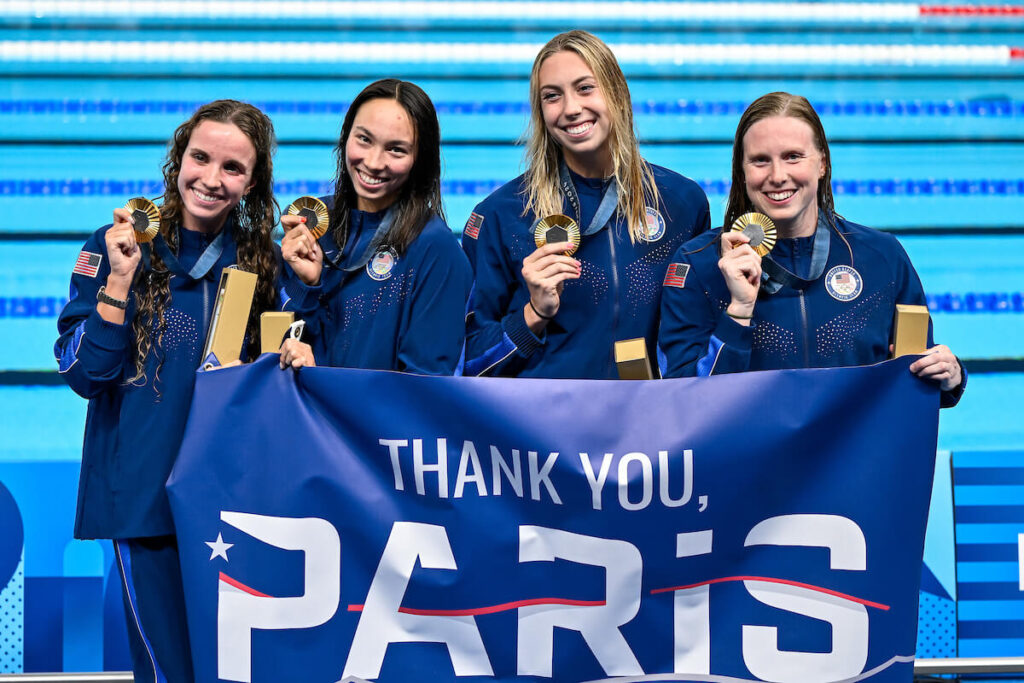Paris Olympics – Best Female Relay: American Women’s All-Star Team Flexed Muscle in Medley Relay Domination
The American women had posted a strong, balanced performance over the first eight days of Olympic swimming, but thanks to Australian freestyle prowess, the U.S. had yet to secure a relay win. They didn’t claim relay gold three years earlier in Tokyo, either, with the team coming up 13-hundredths behind Australia in the 400 medley relay on the final day of competition. This time, though, there would be no doubt of American strength with an utterly dominant performance in the meet-ending medley.
This group had the luxury of deploying three 100-meter world-record holders on their respective legs: Regan Smith on backstroke, Lilly King on breaststroke and Gretchen Walsh on butterfly. Using Walsh on butterfly allowed the U.S. coaches to shift Torri Huske, who had edged Walsh for gold in the individual event earlier in the week, to freestyle. Huske had won silver in the 100 free and owned the top American time this year bey three tenths.
Other countries would bring star swimmers: the Australians with a pair of individual gold medalists in Kaylee McKeown (100 back) and Mollie O’Callaghan (200 free) plus all-time relay swimmer Emma McKeon, China with a dynamite middle potion with Tang Qianting and Zhang Yufei, Canada with veterans Kylie Masse and Maggie Mac Neil plus Sweden anchored by sprint legend Sarah Sjostrom. However, each team had a crippling weakness on at least one stroke that would doom their chances of challenging the Americans. It would not matter, though, as the U.S. team showed up to finish the Olympics in style.
Entering the medley relay, Smith had performed well at the Olympics, winning three individual silvers while scoring gold as a prelims swimmer on the U.S. mixed 400 medley relay, but she had come up against McKeown in the backstroke events and Summer McIntosh in the 200 fly. This time, head-to-head against McKeown on the leadoff leg, Smith came through with a time of 57.28, a new Olympic record and the second-quickest mark ever.
Lilly King — Photo Courtesy: Giorgio Scala / Deepbluemedia / Insidefoto
King followed Smith, just as she did in world-title-winning medley relays in 2019, 2022 and 2023, and after an Olympics in which she failed to win an individual medal, she came through in a breaststroke leg that she professed to be her final Olympic swim. King split 1:04.90, by far the fastest split of the race, even ahead of Tang, the world’s No. 1 100 breastroker this year. At the end of King’s leg, the Americans led by two-and-a-half seconds, and any comeback chance was essentially nil.
So how about following that with Walsh equaling the fastest 100 butterfly split ever, extending the lead despite a host of elite flyers racing in her wake. On the anchor leg, Huske would not match the electric 51.88 split she had posted one day earlier on the U.S. mixed 400 medley relay, and Australia and China each posted quicker splits as they jostled for medal position, but it would not matter as she concluded the swimming portion of the Olympics with a victory lap.
In the end, the Americans finished in 3:49.63, becoming the first group to ever swim under 3:50 and knocking three-quarters of a second off the previous world record set by an American team including Smith and King in 2019. The medal meant that Smith and Huske, both in their second Olympics, would finish with five medals, and for Smith, the medal ceremony would mark the first time she stood atop a gold-medal podium at the Olympics. Walsh, meanwhile, finished her debut Games with four medals.
The win also gave the United States its eighth gold medal of the swimming competition, which was the lowest total for the team since 1988, but this win allowed the Americans to break a tie with Australia for the most golds in the pool.
“We brought the record down a lot. It’s really cool to continue be a part of that relay and watch it get faster and faster,” King said. “It was an awesome way to cap off the meet.”

